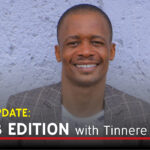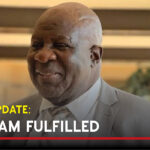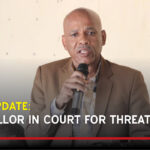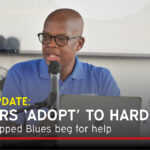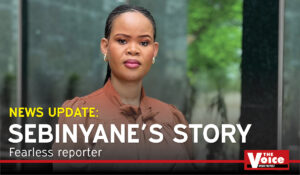Dr. Raphael Dingalo heads Botswana teaching professional council
Dr. Raphael Dingalo is the newly appointed founding CEO of Botswana Teaching Professionals Council (BOTEPCO). The former Limkokwing University Vice Chancellor and CEO of the Human Resource Development Council (HRDC) holds a wealth of experience in the local education and training sector. In this feature, the all rounded educator shares his expectations for his recently assumed role as well as his hopes and aspirations for Botswana’s education sector.
Kindly introduce yourself for the benefit of our readers who are reading about you for the first time. Who is Dr. Raphael Dingalo?
Mr or Dr Raphael Dingalo, whichever you prefer to call me, is the 3rd born son of Mary and Kenneth Ntebang Dingalo, and thank God I am still with both of them.
They are very supportive of their son they call Ndala or Daddy because I have been christened after my Dad.
Briefly give our readers an idea of what your professional portfolio looks like.
I have been in the Education and Training Sector for the better part of my life, lucky to have been appointed the Staff Development Fellow at the then Botswana Polytechnic as Lecturer of Design and Technology, specializing in Graphic Design. This meant spending only a year lecturing before I went for my Masters at the University of Manchester.
Upon completion of my Masters, I stayed for another year before flying off to read for my Doctorate in Education, at the Institute of Education, University of London for a good 5 years, specializing in Curriculum, Policy and Practice.
I then joined the Centre for Academic Development at the University of Botswana before a brief tour as Director at Botswana Government Communication and Information System (BGCIS).
Thereafter I joined Limkokwing as Vice President before joining the then Ministry of Education and Skills Development as Deputy Permanent Secretary.
I had a brief stay in Parliament as Deputy Clerk of the National Assembly and then Chief Executive Officer of the Human Resource Development Council (HRDC).
Congratulations on your recent appointment as the founding CEO for Botswana Teaching Professionals Council. How does it feel?
It is pretty exciting because I am continuing on my journey to contribute towards the education and skills development Sector in Botswana, which is key in driving the nation’s human capital development.
What would you say inspired you to heed to the call of becoming one of Botswana’s all rounded educators?
I came to realise the importance of education as the key force in driving sustainable socio-economic development in the country.
From as far back, both my parents have always been keen on engraving in our minds the importance of a good education.
Maybe because my mother was a teacher, maybe not, but they instilled this belief in us.
What would you count as the highlight of your career as an educator as well as someone who leads a movement that speaks on behalf of teaching professionals across the country?
Being appointed the Chief Executive Officer of HRDC was the highlight of my career as we were charged with a big audacious mandate, of contributing to the transformation of the Country from a resource to a knowledge based economy.
We were a part of the jigsaw puzzle because there are many players involved in the said transformation.
Government adopted a systems thinking approach in this matter where different organisations contribute to the wholesome.
Transformation is a journey, not a destination.
Now to champion the formation of a Teaching Professional Council is another honour, and I will give it the best shot and with my experience, I hope to leave positive footprints.
You are quite esteemed for your inclination towards bringing to light and bringing to attention teachers’ issues, how important is that responsibility to you?
In my view, teachers should be accorded all the attention they deserve and be accorded the status they so deserve.
This is because they lay the foundation on what individuals are to be and their contribution to society at large, in line with the great Philosopher Plato’s maxim that “The quality of the State depends on the kind of education that the members (groups) of the state receive”.
Mention an educator who completely transformed your life and inspired you to do the same for others.
Reading for my B.Ed at the College of Marjons in the UK, I enjoyed the writings of Aristotle, and this one comes quickly to mind: “It is the mark of an educated mind to be able to entertain a thought without accepting it”.
This quote implores us to entertain critique as building and strengthening society. In this context, we need to understand critique as a literary technique that means to critically evaluate a piece of literary work, or a political or philosophical theory in detail.
What needs or existing gaps motivated the establishment of the Botswana Teaching Professional’s Council?
Let me answer this one by referring to what the Education and Training Sector Strategic Plan (ETSSP) identified as challenges besieging the teaching profession in the Country:
-A Lack of a Comprehensive Teacher Education and Professional Development System: one of the most glaring gaps in the Teacher Education system in Botswana is the lack of comprehensive teaching standards and competency-based frameworks.
-Poor Management of Teacher Training and Professional Development: The quality and impact of Teacher Education and Professional Development is not well monitored to ensure value for money.
• Lack of Leadership and Management Competencies: Notable issues with leadership development are that some leaders have not had training for more than 5 years; some new leaders have not been trained and orientated for the new responsibilities, and there is no succession planning and leadership pipeline and/ or talent management strategy.
Since its founding, what progress have you noted in line with addressing the above mentioned?
BOTEPCO is a relatively new organisation and for now I am busy setting up processes, developing regulations to operationalise the Act and recruiting staff.
I will thereafter move quickly towards development of Teaching Standards and a Code of Ethics for Teachers.
This is going to be an engaging process where consultation will be the hallmark.
I will also move fast at developing a high-level system architecture for regulating and licensing teachers.
What progress have you noted with regard to driving policies that are teacher-centered and teacher friendly?
Government has always been committed to improving education in the country if we go by both the Recurrent and Capital budget allocations for the past years.
Of course, the outcome is a bit disappointing, but my approach is such that there should be no finger pointing.
We should work together to find a lasting solution by adopting problem solving theories.
What were your greatest achievements for the two notable education institutions you lead, being the Vice Chancellor for Limkokwing University and CEO for Botswana Human Resource Development Council?
As the Vice Chancellor at Limkokwing University, I led the University to be the first Private Tertiary Institution in Botswana to be awarded University Status by the then Tertiary Education Council of Botswana.
During my time as the CEO for Botswana Human Resource Development Council, we managed to build capacity amongst tertiary institutions to develop Institutional Plans which must be aligned to human resource development plans.
38 out of 40 BQA accredited institutions had developed their plans by the time I left.
I also administered and managed the multi-million Pula Human Resource Development Fund (Training Levy) which resulted in increased work-skills training for improved service delivery.
When I came in, our turnaround times for reimbursing levy payers were a cause for concern, but I was able to reduce the same turnaround to about 2 weeks if all was submitted.
As a leader, who is always pouring into other people’s cups, what do you do to refill yours?
I am an avid reader, and it is through reading that I gain insights into the different ways in which we interpret the world around us. As the saying goes, “The more you read, the more things you will know. The more that you learn, the more places you will go,” I am also reminded of another saying: “Remember a reader lives a thousand lives before they die. The one who never reads lives only once.”
What lessons can you share with those coming up after you?
I am a good listener because I believe that listening is beneficial for understanding and problem-solving; when you actively listen to someone, you can hear different perspectives on an issue and make informed decisions.
I also believe in respecting others because respect is something everyone deserves, whether one has 30 years of professional experience or three.
Showing others respect helps create a healthy dynamic team based on mutual respect.
Finally, thank God it’s Friday, what will you be up to this weekend?
I am going to sit back, relax and enjoy time with my family.
It has been a hectic week believe you me.




